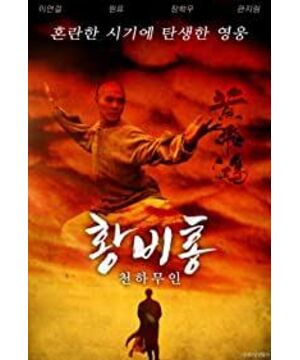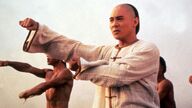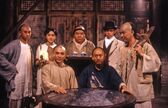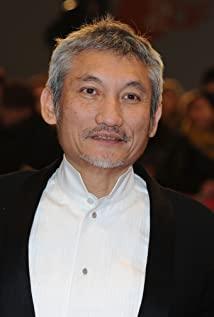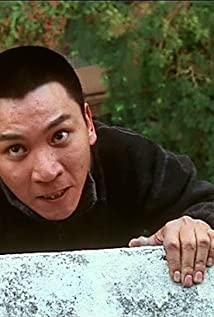Compare the expressions of nationalism in the Once Upon a Time movie series and the Ip Man series. During the semester of exchange in Aarhus, all the courses were more or less related to ethnic groups and nation-state issues. I began to think about some illusory but never quantitative sociological concepts, the public sentiment of Tocqueville, what is the so-called political culture? In our daily life, we always use the so-called Western democracies to define Europe and cover all European countries in a unified schema, but the epidemic is like a magnifying glass. Even within a political body that can be summarized by the same concept, there are still thousands of differences. As a stranger, I am like an anthropologist who has just entered the field. Coupled with a large amount of spare time in the long-term isolation, I try to Enlarging every pore of my body to absorb what I see and hear, how is the influence of untouchable culture absent? It will have a real and profound impact in 2020. The Danes emphasize cooperation and mutual assistance under the high social trust of the Danes; the so-called detached and barbaric Britain has adopted the most Darwinian herd immunity, and was jointly attacked by a group of scientists and thinkers. The conservative country can still pull a Trump-style prime minister back to the normal path, even though it has not admitted its mistake, but has actually adopted more trend-based anti-epidemic measures; the places where the German states with a weaker centralization are fragmented have anti-epidemic measures-- The same is true in Italy; as for the United States, the extreme distrust of the centralization and the state has opened up the possibility of politicizing the epidemic prevention policy; such as Sweden, Japan's ostrich-style epidemic prevention... I have never experienced the strangeness and strangeness of the world so much. Because I am in a different environment that does not follow the logic of our Chinese, at this time, diversity itself even makes me extremely disgusted: the Danish government thinks that it is necessary to experiment in supermarkets whether people should wear masks, hoping to find data to support the effectiveness of wearing masks- -As a result, it was cancelled due to insufficient masks. You can see too many bad jokes, and that's what I got the most from my trip to Denmark.
If there is only one thing in common, it can only be that the nation-state is still so strong today, although we speak of imagined community every day (having to complain that when most people use it, it completely distorts the true meaning of the phrase), society Science and political science have revealed the internal logic of the concept of the state, although it has no substance, but it has a real impact, so that many people - people who think they are in a high position - think that the nation-state is nothing more than some kind of "brainwashing", "" The "foolish people" thing is some kind of illusory existence. These people are advised to look at Durkheim's exquisite account of "social facts" in Basic Forms of Religious Life. However, on the other hand, during the epidemic, many large-scale anti-epidemic activities in the United States, black lives matter, made me have to think, today, does identity politics have the possibility to replace the identity of the nation-state to some extent? Under the crisis, politics intensifies polarization and division, and even turns society into two completely opposite factions-perhaps Marx's so-called class awakening should be established in this sense. It is for this reason that the title of the thesis is set as the expression of nationalism in film.
Benedict Anderson (2006) has argued that the printed media facilitated the construction of nationalism and national consciousness. The events reported in the newspaper happened at the same time, which gives the readers a feeling that someone is meanwhile doing something with him and react similarly to the accidents, thus evoked the sentiment that they were bonded to the same group and they all belonged to a shared destiny. Cinema has also functioned as an important vehicle for the “maintenance and reinvention of nationhood.” (Lu and Yeh, 2005:4 ) As early as the beginning of the twentieth century, the relationship between Wushu (or lately known as Kungfu) and nationalism was consolidated by martial arts films. In recent years, the tetralogy of Ip Man filmed by director Donnie Yen has been very popular in China and won huge success in box office.Before the appearance of this series, most people who had heard of Ip Man only knew that he was the master of Bruce Lee. Ip Man (1893 ~ 1972), born in Foshan, is a martial artist who promoted Wing Chun(王春) Boxing in the Chinese world and known as the "Grandmaster of the Generation". In these films, nationalism is expressed by placing the background and characters in national-humiliation narrative. WhenIp Man 1 won the Hong Kong Golden Award for Best Film in 2008, many people believed that the Hong Kong martial arts film had gained its popularity again, but the fact was quite the opposite. The nationalist expression in the film could not withstand scrutiny, even can be considered as cater to the populism of the market in Mainland China.
The Anxiety of Body
Since modern times, the typical Western attitude towards the Chinese was to treat Chinese as sick men in eastern Asia. In 1896, Western Newspaper (word Linxi Pao) in Shanghai reprinted a monograph which originally published in a British Newspaper. Later, the Times News(Times News) translated and published it and then caused extensive discussion at that time. It's said in the article that China is the real sick man in the East. (Recently, because of the pandemic, a comment in the Washington Post also used literal meaning of the title "China is the real sick man", which has caused widespread protest in China, and Beijing even expelled several American journalists. ) As a result, the term "sick man in East Asia" spread to the intellectual circles in the late Qing Dynasty. The Chinese were imagined as inferior with their weak bodies and spirits, and the Chinese nation lacked masculinity in the eyes of Westerners. This has become a physical anxiety that modern Chinese intellectuals cannot escape and also profoundly influenced their political demands. For them, on the one hand,they studied modern technology from the West, and on the other hand, they were also eager to return to the ancient times to find the missing masculinity.
In such a specific historical and cultural atmosphere, martial art movies show a unique cultural meaning relating to nationalism. Based on such demands, the nationalism plots in most martial arts movies is a product of self-imagination. The physical anxiety of the lack of masculinity is transformed into inner shame of hatred. By creating a competitive platform centered on physical combats, this anxiety is released in a victorious manner by force, and masculinity is re-confirmed.
The conflict in the Ip Man series is indeed quite one-sided and lies in a simple dichotomy: Chinese and foreigners. The foreigners in the film are more or less arrogant racists: Japanese invader Mirua who thinks that Chinese Kung Fu inferior to Japanese karate in Ip Man 1 ; Twister, a British boxer who feels able to defeat all Chinese Kung Fu masters in Ip Man 2 ; the gangster played by boxing champion Twister in Ip Man 3 and Barton a military officer who believes that white Americans are the most superior race in Ip Man 4. In each part, the provocation of the foreigners and the disdain for the Chinese eventually raise personal grievances to the national confrontation. As researcher Siuleung Li pointed out: “The bare-handed fight symbolizes a middle, heterogeneous, interlaced and temporary space. In this space, on the one hand, swords and other pre-industrial weapons have become obsolete and lost their power; on the other hand, the most effective killing weapons in the modern technological era, such as guns, cannot be used casually.”( 2006:103) These settings strengthen the authenticity of physical combats, while weakening the superiority of modern technology. By creating a temporary self-sufficient space and a final fight which the Chinese will always win, the kind of nationalism concerning with the body of a nation can be smoothly expressed.
At the same time, for the structure of the story, the series is more action-oriented, and sued the most typical Hollywood-style action film structures—beginning with a 15-minute action scene, by the half of the film a big one , then two small actions and end with a final action scene. If it is in other types of films, for such a narrative structure, most audience won't buy it and seldom will they choose to watch this kind of films simply because its action scenes are often not as good as the real Hollywood ones. The simplicity of the story is the most criticized part of the series, but this does not prevent the film's success at the box office. As the director Donnie Yen concluded: “We have created a mighty Chinese fighter who fought for the nation's honor and dignity. This is why it touches the soul of the audience."This national pride is the very reason behind Ip Man's successes.
The question is whether this expression of nationalism is due in the film, or is the director deliberately catering to it? The “Mainland and Hong Kong Closer Economic Partnership Arrangement (CEPA)” signed in 2003 provides better conditions for Hong Kong films to expand into the mainland market. However, since the mainland film industry does not implement a grading system, Hong Kong films must undergo stricter censorship when entering the mainland market. In this case, in order to success in the box office of the Mainland, it is undoubtedly a wise decision for the Hong Kong directors to choose a theme with lower risk. After countless failures, they found that nationalism became the greatest common divisor of film creation. Therefore, in the sluggish state of Hong Kong film market,films with the theme of nationalism are chosen as a breakthrough in the mainland. One good example is Dante Lam who directed a series of main melody movies which shows the spirits of Chinese soldiers, includingOperation Mekong (2016) and Operation Red Sea (2018). When Ip Man 4was released, the Sino-US trade war has lasted for more than half a year. The villain in the story is a military officer who believes America first. Seeing the Chinese being suppressed and humiliated in Chinatown, Ye asks: "Why don't we fight back?" Ip Man defeated the US military officer in the last action scene and it is through him the director straightforwardly states what the nationalists in Mainland China most wanted: "Chinese will always defeat Americans." Ip Man has never been to the United States in reality. Such a fictional plot is a metaphor for the deterioration of Sino-US relations, but the director's answer precisely caters to the prevalence of populism, oversimplifying the confrontational relationship and ignoring the most needed win-win cooperation under globalization.Is the director not aware of that? As a Hong Kong dweller, he certainly knows the important role of normalization of Sino-US relations on Hong Kong 's economic status. However, to convey this kind of idea, the nationalistic narrative of the film will become a problem.
Humiliation
China 's history since the Opium War is called "the Century of National Humiliation." A series of colonial invasions and the signing of unequal treaties have led to the gradual loss of national sovereignty and territorial integrity. However, the emphasis on this history of humiliation only emerged during the post-Cold War period. The end of the cold war did not cause Communist China to deconstruct as it dissolved the Soviet Union and Yugoslavia but Marxism-Leninism has been on the wane in China since the mid-1980s as the result of Deng Xiaoping's economic “reform and opening” policy. In the first few years of the post-Cold War period, the biggest crisis the Communist Party faced was the crisis of ideological legitimacy. The state needed to rediscover an ideology that can connect its citizens.It was also at this time that patriotic nationalism became the best substitute as “humiliation is a key part of modern Chinese subjectivity.” (Callahan, 2004:8)
On the basis that the audience is quite familiar with this narrative of national humiliation, no matter in which one, the Ip Men sires tries to create such a humiliating atmosphere. The country is invaded by the Japanese, and the Japanese despise the Chinese; the national sovereignty is still unfinished while the British colonists still control Hong Kong; even in the United States, a series of coincidences makes Ip Man meet many white racists, trying to show that the starting point of his action is only about national dignity and national spirit .
Abbas thinks that “It is not that the Kung Fu film is ever a direct critique of colonialism, rather, that the ethos of (mainly) male heroism and personal prowess so central to the genre has to define itself in relation to what is felt to be possible in a changing colonial situation. In defining heroism, it defines by implication the colonial situation itself.” (1997:29) In his view, the "enemy" in Kung Fu movies is always ambiguous, and the protagonist does not always know who the real enemy is. But in Ip Man, the enemy is clear. Nevertheless, once the villain is made clear, the theme of nationalism loses its support. This theme is difficult to be embodied in individual characters, and it is only by laying the hatred on the colonizers as a group of people can it rises the rebellious actions driven by nationalism. Nationalism evokes the national classification, and to appear reasonable its opposite must also be the same classification rather than individual. Just as in Ip Man 2, the director tried to put his criticism to Hong Kong colonialism, then this dramatic ending just dispelled the effectiveness of this criticism. Although Ip Man defended the national dignity with the victory of the game, it is the more authoritative British colonial authorities who ultimately made a fair ruling for this conflict. The two negative images in the film: the foreign police chief can only be regarded as a model of arrogance and insatiable bureaucracy at best, and the rudeness and arrogance of the boxer Twister are in sharp contrast with the British gentleman under the stage and therefore it is difficult to regard him as a representative of the British colonists. From this point of view, the nationalism that is vigorously rendered in Ip Man 2finally becomes merely a bluff. All settings are aimed at guiding the climax of the film to the final battle with no firearms and no comparison of national strength. The dignity of nationalism is then ultimately maintained in martial arts based on physical strength. This is probably unexpected by the director.
“Humiliation comes not just from 'foreign invasion' but also the result of 'domestic corruption.'.” (Callahan, 2004:10) Addition to external enemies, every national-humiliation in Chinese textbooks must come along with the internal one, which is rarely seen in the Ip Men series. Only by adding the factors of internal crisis can such martial art films touch the essential part of national narrative—the discussion of national character. As in Once upon a Time in Chinadirected by Hark Tsui, when the protagonist Wong Fei-hung defeated the bully and sought witnesses, the crowd who had just stood by and witnessed the scene dispersed in fear of getting involved into trouble. Instead, only the foreign priests stood up to testify. What the film is trying to say is that it's the conservatism, indifference and arrogance in every Chinese that are reasons for China's weak position. This way of dealing with nationalism is more rational, but it is difficult to be compatible with populism.
The details of the film implicitly dispelled the subject of nationalism, but the various techniques adopted in the film still effectively evoke the nationalist emotion of the audience. The film follows the most common form in other Kung Fu movies which is similar to a boxing game and it is easier to stimulate the audience's sense of identity when the dichotomy lies only in two individuals. The film is also good at mobilizing the emotions of the audience with his desire to move forward. In each film, Ip Man 's friends will sacrifice. The more tragic the death of these characters, the stronger the indignation in the audience 's heart and the more heroic the image of Ip Man is. “The narrative of national salvation depends upon national humiliation; the narrative of national security depends upon national insecurity .” (Callahan, 2004:13)
In general, by continuing the relationship between the prosperity of the country and the body of the nation, together with the national humiliation narrative popular in China, Ip Man incited the nationalist emotions of the audience. Although such a simple dichotomy of nationalism is too simplified and one-sided, it is also this thinness that has made the Ip Man series a huge box office success.
References
[1] Callahan, WA (2004). National insecurities: Humiliation, salvation, and Chinese nationalism. Alternatives
[2] Zhouxiang, L., Zhang, Q., & Hong, F. (2014). Projecting the 'Chineseness': Nationalism, identity and Chinese martial arts films. The International journal of the history of sport
[3] Abbas, A. (1997). Hong Kong: Culture and the politics of disappearance. Hong Kong University Press.
[4] Li, SL (2001). Kung Fu: negotiating nationalism and modernity. Cultural Studies
[5] Emilie, YEH (2005). Introduction: Mapping the field of Chinese-language cinema. In Chinese-language film: Historiography, poetics, politics (pp. 1-24). University of Hawaiʻi Press.
[6] Anderson, B. (2006). Imagined communities: Reflections on the origin and spread of
nationalism. Verso books.
Storyboard
View more about Once Upon a Time in China reviews


